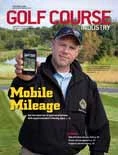I used to resist new technology. Call me old fashioned or a nonconformist, but I think I was just plain, old stubborn. In fact, I was the last one among my friends and peers to get a cell phone (pay phones anyone?), an MP3 player (I love vinyl) and a digital camera (I’m a film purist).
Now, I have a single handheld device that does all three and it’s the size of a stack of business cards. Like an arm or a leg, it’s become a vital extension of my physical self. I can’t imagine functioning without it and I always feel less than complete when I leave it at home or in the car. I’ve assimilated and I’m happy.
This month’s cover story looks at the effect smartphones – items like iPhones and BlackBerrys – are having on turf care professionals. One of the initiated, superintendent William Brown, CGCS, claims his iPhone is one of his most powerful on-the-job tools.
Brown says these tools, and especially the
applications, or "apps," that give them so much value, make him a better superintendent.
So, what if you don’t consider yourself a high-tech disciple and you’ve resisted adopting this new technology and making it part of your daily routine?
I’ve discussed the predicament with people who are less than tech savvy and they have preconceived notions that the devices or programs are too complicated. Or, they say it’s a generational issue and they dismiss new technology because it’s not the way they’re used to doing things.
It’s short sighted to approach technology with suspicion. As you’re well aware, communication is a leader’s best asset in running a successful team or operation. Being an effective communicator isn’t just about speaking clearly; it’s about being receptive to information. For superintendents, tools like iPhones and BlackBerrys increase accessibility to data and enhance the flow of information.
Take Brown’s recommended applications, for example. (See the cover story on page 24). Not only does it include Turfgrass Management, a powerful turf app developed at the University of Georgia, but he also recommends irrigation control programs, weather-related services and even programs for document sharing and social media, to name a few. Additionally, many of these applications are free to download or are accessible for a minimal cost.
Brown’s smartphone frees him to focus more time on what he really wants to do – troubleshoot problems and help maintain the courses he’s responsible for as a regional agronomist.
These applications have the potential to be difference-makers for superintendents and the golf industry. Like with most technology, these apps won’t do your job for you, but they will allow you to be a better professional, which will make a noticeable difference at your facility. Isn’t it time you put aside any preconceived notions and expand your digital horizons? GCI

Explore the October 2009 Issue
Check out more from this issue and find your next story to read.
Latest from Golf Course Industry
- From the publisher’s pen: Conscientious of a bigger role
- Bernhard and Company partners with Laguna Golf Phuket
- Terre Blanche showcases environmental stewardship
- VIDEO: Introducing our December issue
- Bernhard and Company introduces Soil Scout
- Nu-Pipe donates to GCSAA Foundation’s Centennial Campaign
- GCSAA enhances golf course BMP tool
- Melrose leadership programs sending 18 to 2026 GCSAA Conference and Trade Show





